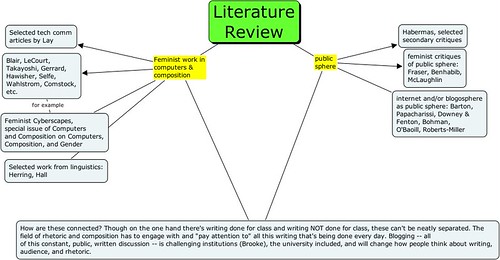When I teach technical communication, I try not to make it too dry and "how to" oriented. We cover "how to," of course, but I like to bring in interesting and current cases that illustrate how the kinds of documents we write in class actually work in the world. Last time I taught tech comm, I pointed to the torture memos to show the function of a memo, the importance of primary and secondary audience awareness, and the ways that memos can be circulated and used. When we discussed research reports, I brought in the Gap, Inc. Social Responsibility Report. I used it to talk about how authors of reports address a rhetorical context and situation -- in this case, accusations that the corporation uses sweatshop labor -- and establish an ethos. For the Gap report, we also talk about their use of images and colors to neutralize their opposition.
I also bring plenty of humor into the discussion. I've long used the Dilbert Performance Review Generator and the Mission Statement Generator as a point of entry into talking about discursive practices in organizational and professional settings. For example, the start page of the Performance Review Generator says:
You have to review the performance of a co-worker who exhibits the intelligence of a slug, but since today's incompetent co-worker could become tomorrow's incompetent boss, you don't want to say anything offensive. Do you lie?
Solve the problem with Catbert's Performance Review Generator! Its vague sentences can be interpreted as praise by your dimwitted co-worker, but you'll know that "you would be lucky to get him to work for you" means he never works.
I bring in the laptop and attach it to the LCD projector, and we have a good bit of fun as I enter students' names into the Performance Review Generator and read them aloud. Then we talk about what the performance reviews reveal in terms of communication styles in organizational and professional settings, e.g. the indirectness and tact spoofed to great effect in Office Space:
Performance Appraisal for Ms. Ratliff:
Ms. Ratliff is not afraid to ask questions that check the assumptions of others. Ms. Ratliff makes decisions with minimal direction. A reevaluation of her salary is long overdue and the possibility of hiring more employees like her should be discussed immediately. It is apparent that she sets a compelling example for the younger employees. For completeness I should mention that Ms. Ratliff shows an interest in related tasks not assigned to her.
* In Strict Confidence *
For the Mission Statement Generator, I like to direct students' attention to the word banks. We look at each group of words and use them as a starting point to discuss the values that are privileged in American culture and the economy (though I know there no singular, monolithic "U.S. economy," to be sure):
Adverbs:
quickly, proactively, efficiently, assertively, interactively, professionally, authoritatively, conveniently, completely, continually, dramatically, enthusiastically, collaboratively, synergistically, seamlessly, competently, globally
Verbs:
maintain, supply, provide access to, disseminate, network, create, engineer, integrate, leverage other's, leverage existing, coordinate, administrate, initiate, facilitate, promote, restore, fashion, revolutionize, build, enhance, simplify, pursue, utilize, foster, customize, negotiate
Adjectives:
professional, timely, effective, unique, cost effective, virtual, scalable, economically sound, inexpensive, value-added, business, quality, diverse, high-quality, competitive, excellent, innovative, corporate, high standards in, world-class, error-free, performance based, multimedia based, market-driven, cutting edge, high-payoff, low-risk high-yield, long-term high-impact, prospective, progressive, ethical, enterprise-wide, principle-centered, mission-critical, parallel, interdependent, emerging, seven-habits-conforming, resource-leveling
Nouns:
content, paradigms, data, opportunities, information, services, materials, technology, benefits, solutions, infrastructures, products, deliverables, catalysts for change, resources, methods of empowerment, sources, leadership skills, meta-services, intellectual capital
What I'd like to start doing, though, is using some of those hilarious letters by Joey Comeau. They're brilliantly ridiculous lampoons of the bravura and hyperconfidence one is expected to demonstrate in cover letters and the innovative and groundbreaking plans and ideas one is expected to have. My favorites are the application for the position of Systems Analyst in the Transplantation Services Department of Queen Elizabeth Hospital*, Salesperson for Toyota**, and the best of all, a letter applying for a position at Microsoft addressed directly to Bill Gates:
I want to start a program down there at Microsoft, where every week five hundred random employees are selected to spend ten thousand dollars of your money each, on making the world more perfect. I want to approve budget increase of fifty thousand dollars for the janitor's idea to build a chess computer that loses every game and hates you for it. A computer that is the worst kind of poor loser.
I want to put satellites into orbit that do nothing but make life better for children, that broadcast an unending documentary we finance where we interview old women and ten year olds about their best friends, where we talk to the CEOs of fortune 500 companies and Tom Cruise and they tell us about that summer by the lake. I want to save the world. Money is so awesome.
Do any of you do anything like this when you teach tech comm? I'd love to hear about it.
Also, I'm down in Alabama for the Thanksgiving holiday, where I'm going to try to participate in Buy Nothing Day. Blogging may be light for the next week.
*(update) This letter also does a fine job of making fun of the Deep Passion for the job that an applicant is supposed to express.
** On second thought, I wouldn't use this one (see the antepenultimate paragraph).





